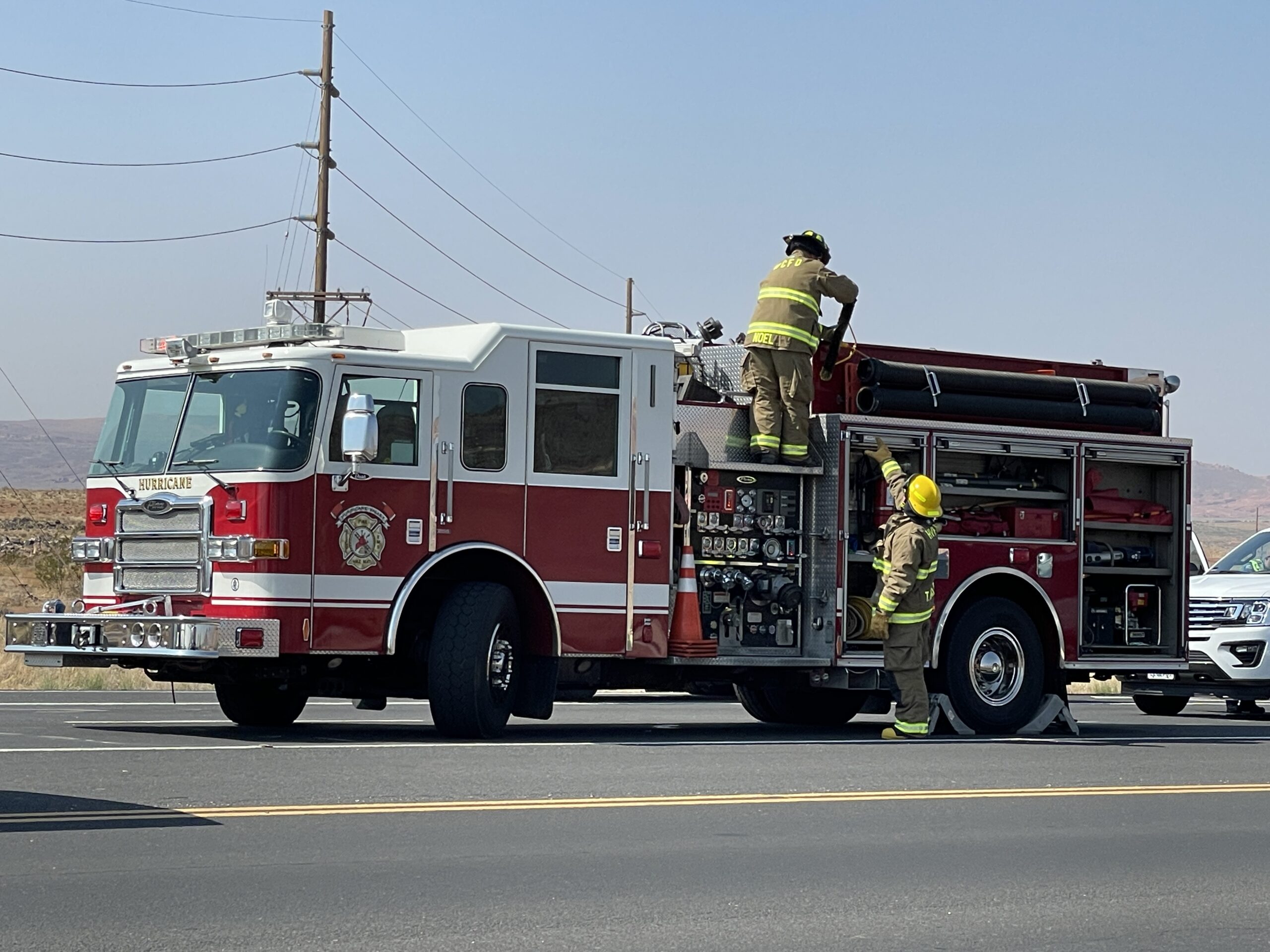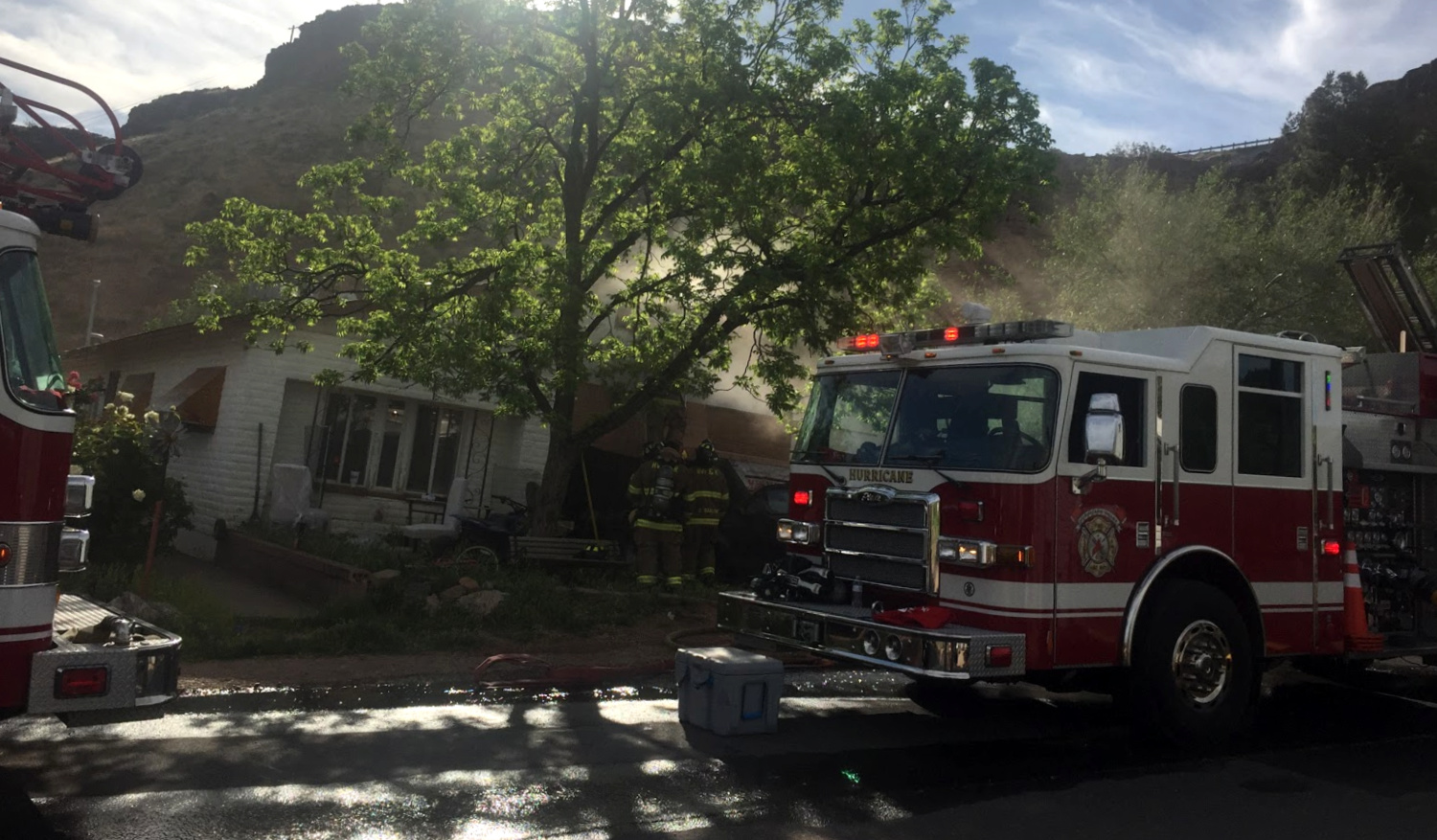ST. GEORGE — For the second time in recent years, Washington County residents living within the boundaries of the Hurricane Valley Fire District are facing a hefty tax increase.

Outlining budgetary stressors such as a rapidly growing population and tourism, increasing call volumes, inflation and other factors, the Hurricane Valley Fire District is proposing a nearly 90% property tax increase. This would help recapture and sustain the funding power of a previous tax hike approved in late 2016. Property taxes rose by 74% at the time.
“I don’t want to pay more taxes either,” said Keen Ellsworth, a Toquerville resident who is also the fire district’s business manager. “Problem is, we need the services the district provides.”
Formed in 2007, the Hurricane Valley Fire District has grown to encompass much of eastern Washington County, including Leeds, Toquerville, LaVerkin, Hurricane and the communities up the state Route 9 corridor up to the gates of Zion National Park.
A truth in taxation public hearing for the proposed tax hike is set for Monday, Nov. 21, in LaVerkin.
The tax problem
The 2016 tax increase put the fire district property tax levy at a rate of 0.001408 starting in 2017. However, due to how Utah tax law is set up, that amount gradually dropped each successive year until reaching a rate of 0.000723 for 2022.
Under state law, taxing agencies like the fire district are guaranteed revenue matching the amount set in their previous year’s budget, and they cannot collect any more or any less than that. This means that when the market is doing well, the tax levy will go down since a taxing agency can’t take in more revenue. An exception to this is taxes derived from new construction.
However, the opposite happens when the market slows. Guaranteed the same amount of money as the year before, the amount required by the tax levy remains the same, even while the assessed or taxable value of the property has gone down.

The fire district is proposing to up the tax levy to 0.001589, which translates to an 89.3% increase in property tax for those living within the district’s jurisdiction.
The owner of a property valued at $273,700 based on the current rate will owe $197.89 this year, while the proposed rate will jump that up to $374.70.
“It’s a significant increase, I won’t deny that,” Ellsworth said while continuing to express the need for the increased rate.
‘Increase’: Reasons for the tax increase
According to the fire district’s proposed 2023 budget statement, the current tax rate provides 45% of what would be provided by the 2017 rate.
Since 2017, emergency call volumes have increased by 14.45% annually, while the cost of fire engines has jumped 28%. Insurance costs have also risen by nearly 12%.
In a news post on its website, the fire district also listed some of the more extreme examples of rising expenses. This includes an overall 21% increase in inflation and increasing supply costs since 2017:
- Bandages have risen in cost by 650% ($0.30 to $1.94).
- IV drips have gone up 79% ($145 to $260).
- Fuel has jump 81% ($2.87 a gallon to $5.20 a gallon).
- Protective gear also has gone up by 56% since 2017.
“Retaining our 2017 property tax level would have met the needed stability necessitated by growth,” according to the district’s budget statement.
The word “increase” or some variation of it, is evident throughout the budget statement in reference to rising equipment and supply costs, personnel costs, population and tourism that trigger a high level of emergency calls and so on.

“We continue to face multiple challenges presented by expanded growth, diminished proactive staffing time and constantly changing physical resources as we continue to provide service to the citizens of the District,” the proposed budget statement reads. “This budget proposal continues to address our major challenges and is designed to stabilize the District’s level of service and continue striving to reach our ever expanding five-year plan.”
Property taxes make up just less than half of the fire district’s budget, Ellsworth said. Other funding avenues include grants, ambulance transport fees, wildland suppression compensation and operational fees.
The fire district also operates with used and refurbished equipment where possible, the district noted in its proposed budget statement.
Should the new tax rate pass, it will allow the fire district to operate without having to borrow funds, Ellsworth said. Last year the district had to borrow $3.4 million in order to keep operations going at the current level. While the new tax rate will prevent the need for new borrowing, it won’t provide funding to pay off the debt, Ellsworth added.
With funding restored to approximate 2017 levels, the fire district plans to hire additional personnel as well as see to the construction of new fire stations.
Up to 75% of the tax hike will go to paying for fire district personnel and their compensation, while the remaining 25% will go to supplies as well as refurbished and used equipment, Ellsworth said.
“The fire district is being responsible,” he said. “It’s just expensive.”
‘Not justified’ and ‘extreme’
Opposition to the proposed tax increase has been strong from some individuals and municipalities within the fire district.
Jay Crosby, who owns properties within the fire district, said he opposed the 2017 tax hike and felt his objections went unheard. This time he said he hopes to make more of a difference.
“My voice didn’t do any good,” he said. “This isn’t a good time for this. We’re about to go into a recession.”

Crosby’s words echoed concerns over the nation’s present economic state that were cited in a recent St. George City Council meeting when the city proposed to increase property taxes for public safety funding. Fears of a pending recession, continuing inflation and the overall financial strain on everyday residents were considered factors in the measure’s defeat.
Hurricane resident and former mayor John Bramall also voiced his concerns over the matter.
“I support the fire district and the people, but a 90% increase is too much,” he said. “We have to live within our budgets.”
If the fire district were proposing a more moderate increase, like 25% for example, Bramall said he’d have no problem with it. Yet, with a possible economic slowdown on the horizon and construction slowing down, he also said “it’s not a good time.”
During a special open house meeting held in Toquerville on Wednesday, Toquerville Mayor Justin Sip read a letter from himself and the City Council addressed to the Hurricane Fire District’s board outlining their opposition to the tax increase.
“Inflation is currently at a 40-year high and the Federal Reverse has raised interests rates six times in the last year,” Sip read. “In this setting, it is unfortunate that the district has felt it necessary to increase its mill rate so dramatically.”
After reviewing the district’s proposed budget, Sip read that he and the council felt “the proposed increase is not justified and is extreme.”

The letter further states that the residents of Toquerville and other communities under the fire district’s umbrella should not have to “bear the burden” of the tax increase. It also states that concerns about raising the tax levy should have been done incrementally so higher rates would be more manageable and palatable for residents rather than overwhelming.
That was a point addressed in the district’s proposed budget. District officials had planned to hold annual truth in taxation hearings as they proposed gradual increases year-to-year. However, these hearings were continually postponed at the request of Washington County officials, according to the budget statement.
“Holding truth-in-taxation annually was part of the 2017 truth-in-taxation proposal,” the statement reads. “It has been postponed annually at the request of the county … Truth-in-taxation is vital to our continued operations. It is necessary to prevent a decreased level of service created by a staffing stagnation or reduction.”
Toquerville’s mayor and City Council are not the only elected officials opposed to the tax increase as Hurricane Mayor Nanette Billings also said she and her city’s council also stood against it. She and the Hurricane City Council will submit a letter to the district’s board outlining the reasons for their disapproval of the proposal.
“I have carefully analyzed the budget data,” Billings said. “I can not support a tax increase of this magnitude.”

Reasons for Billings’ own misgivings included what she considered to be limited and incomplete information in the fire district’s proposed budget, information on where the money of the tax hike would go not being adequately portrayed to the public and the practice of using one-time money to fund ongoing commitments.
Billings is a member of the fire district’s board, which she described more as an advisory and recommendation-giving body. The true legislative power that approves the board’s recommendations is the Washington County Commission, she said.
“We’re requesting the commission deny this proposal,” Billings said.
Public hearing details
A public hearing will be held at the LaVerkin City Council Chambers at 111 S. Main St. in LaVarkin at 6:01 p.m., Monday, Nov. 21.
If you desire to speak at the hearing, you will need to email the Fire District at [email protected] by noon on Monday.
Additional information can be found on the Hurricane Valley Fire District website.
The tax increase is a part of the fire district’s proposed 2023 budget. If approved by the fire district’s board, it then goes to the Washington County Commission for final approval or denial.
Copyright St. George News, SaintGeorgeUtah.com LLC, 2022, all rights reserved.